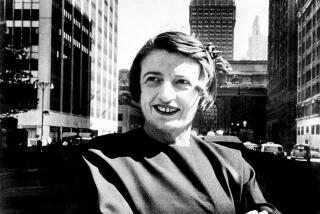Paul Ryan loved Ayn Rand, before he said he didn’t
Back in 2005, an up-and-coming lawmaker named Paul Ryan credited the polemical novelist and libertarian Ayn Rand as a central inspiration for his entry into public life. Ryan toiled in those days in relative obscurity, a well-respected but low-profile member of the House of Representatives.
By the spring of 2012, the boyish congressman had become a Republican star, widely named as a possible vice presidential pick. He also had become considerably less comfortable being linked to the controversial Rand, an atheist with a tartly Darwinian world view.
As Ryan and the Republicans look to define the new vice presidential choice’s brand, part of the commentary will be about just how Randian (read: unsympathetic to the weak) the candidate really is.
Photos: Paul Ryan added to Romney’s ticket
Ayn (rhymes with “fine”) Rand wrote the bestselling “Atlas Shrugged.” She also encouraged the world’s “makers” to pursue “rational self interest” as “the highest moral purpose of [one’s] life,” while giving little care to the nefarious “takers.”
Journalists who have recently written about Ryan suggested that his infatuation with the Russian émigré author, who died in 1982 at age 77, has hardly waned. The favorite son of Wisconsin has recently been insisting that his embrace of Rand amounted to a youthful infatuation. In an April interview with the National Review, Ryan said that the reports linking him to Rand were essentially “an urban legend.”
“I reject her philosophy,” Ryan told Robert Costa of the National Review. “It’s an atheist philosophy. It reduces human interactions down to mere contracts and it is antithetical to my worldview.” He added that he had merely “enjoyed a couple of her novels,” which also included another bestseller, “The Fountainhead.”
But Ryan made no bones about his philosophical influences just a few years ago. He told the Weekly Standard in 2003 that he gave his staffers copies of “Atlas Shrugged” as Christmas presents. Speaking to a group of Rand acolytes in 2005, Ryan said, “The reason I got involved in public service, by and large, if I had to credit one thinker, one person, it would be Ayn Rand. And the fight we are in here, make no mistake about it, is a fight of individualism versus collectivism.”
Even three years ago, Tim Mak of Politico noted, Ryan channeled Rand. “What’s unique about what’s happening today in government, in the world, in America, is that it’s as if we’re living in an Ayn Rand novel right now,” Ryan said. “I think Ayn Rand did the best job of anybody to build a moral case of capitalism, and that morality of capitalism is under assault.”
But by the time he introduced his austere budget plan this year — calling for an end to Medicare as a mandate and its replacement for many Americans with a system of vouchers — Ryan was being depicted as a harsh absolutist. He did not need to be tied too closely to Rand and her sink-or-swim imperatives.
Jonathan Chait, writing in New York magazine, suggested Ryan cannot slough off his connections to Rand’s thinking that easily. The journalist cited Ryan’s 2009 remarks about the immorality of government attacking productive members of society.
“It is not enough to say that President Obama’s taxes are too big or the healthcare plan doesn’t work for this or that policy reason,” the lawmaker said. “It is the morality of what is occurring right now, and how it offends the morality of individuals working toward their own free will to produce, to achieve, to succeed, that is under attack, and it is that what I think Ayn Rand would be commenting on.”
Chait said that Ryan has frequently invoked Rand’s idea of “makers” subsidizing society’s “takers.” In the New York story, he summed up the writer’s libertarian philosophy as “a defense of capitalism in general and, in particular, a conception of politics as a class war pitting virtuous producers against parasites who illegitimately use the power of the state to seize their wealth.”
While the congressman may not be a pure Randian “Objectivist,” Chait opined, he hews to a particular vein the philosophy in support of supply-side economics and the imperative of cutting taxes and reducing role of government. Jack Kemp, an earlier Rand-follower and vice presidential nominee, took the same position. (He also was one of Ryan’s first bosses when Ryan worked as a Capitol Hill staffer.)
In his National Review interview contesting his ties to Rand, Rep. Ryan suggested another more important influence. “If somebody is going to try to paste a person’s view on epistemology to me,” he said, “then give me Thomas Aquinas.”
Aquinas was a saint, after all, who was said to disdain secular philosophy in favor of Christian revelation — a view unlikely to scare up criticism at a town hall meeting in Sheboygan or Rapid City.
Follow Politics Now on Twitter
Twitter: @latimesrainey
More to Read
Sign up for our Book Club newsletter
Get the latest news, events and more from the Los Angeles Times Book Club, and help us get L.A. reading and talking.
You may occasionally receive promotional content from the Los Angeles Times.









